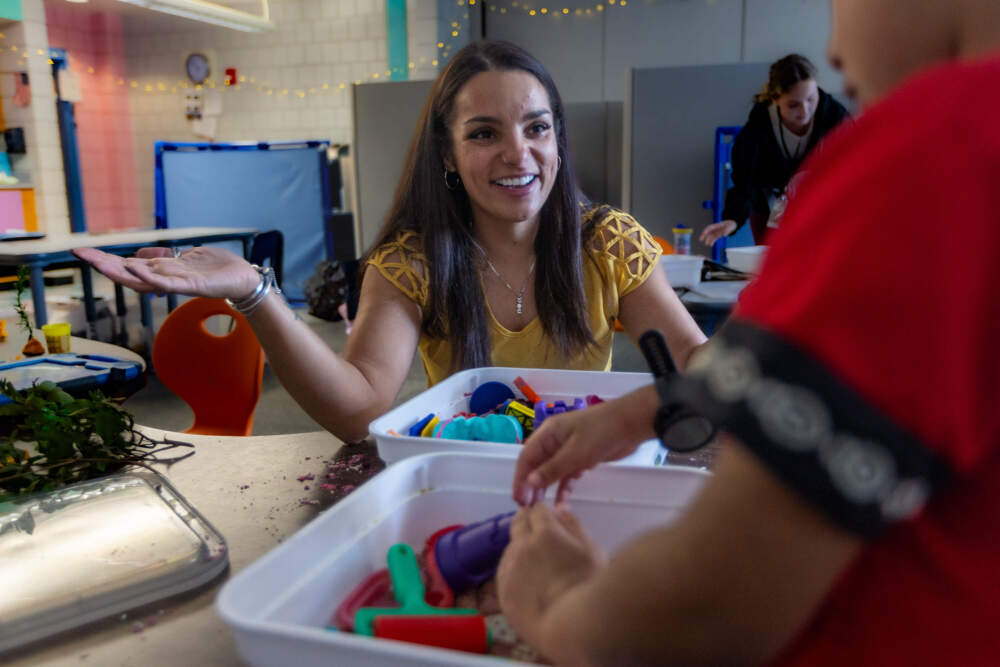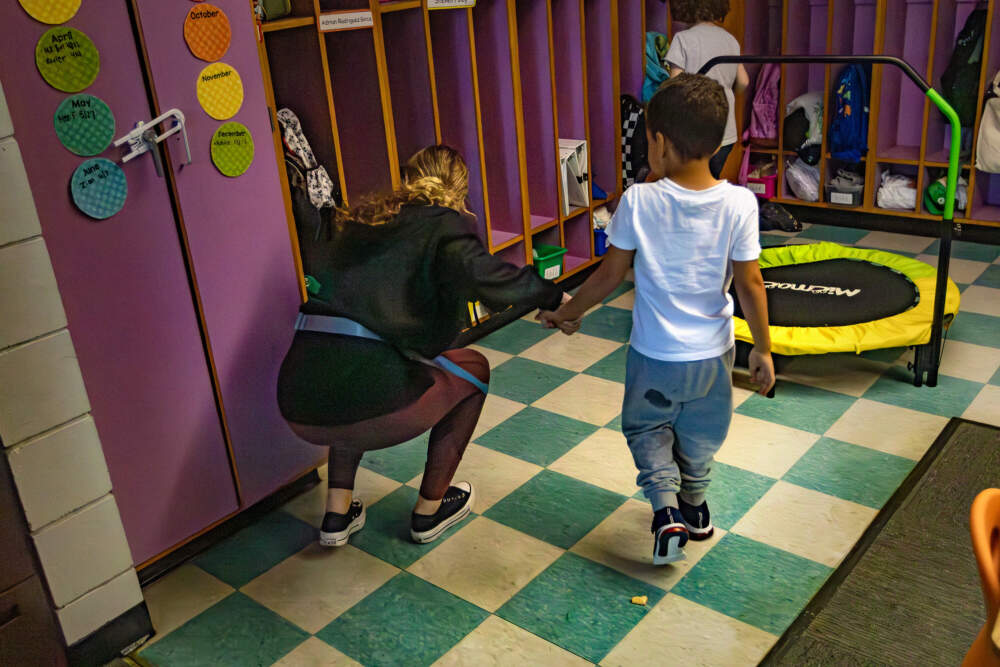Advertisement
As paraprofessionals face barriers to teaching licenses, one district is paying for their master's degree
On a recent morning at Pentucket Lake Elementary in Haverhill, Room 109 hummed with busy kindergarteners, first- and second-graders. One student bounced on a trampoline; another ran his fingers through a bin of sand.
Paraprofessional Tiffany Ramos sat nearby, encouraging a child to build a sandcastle. In the classroom of about 10 children — all of whom are nonverbal — Ramos plays a crucial role: providing one-on-one student support.
Ramos started working as a para four years ago, and she eventually hoped to get certified as a special education teacher. She liked the idea of more responsibility and higher pay. But between work obligations and caring for her kid, that goal was pushed to the backburner.

She is not alone. Several industry experts say many paraprofessionals struggle to obtain their teaching licenses. Despite rich classroom experience, the researchers explain support teachers sometimes don’t have enough time or money to complete the requirements.
As some paraprofessionals feel stuck, some communities are exploring new programs to make it easier for them to earn teaching licenses. This year, Haverhill Public Schools partnered with Merrimack College to offer district paraeducators entrance into a free, two-year special education master's degree program.
Challenges for paraprofessionals
In Massachusetts and across the nation, certified special education teachers are in high demand. Fewer people are graduating from teacher preparation programs in Massachusetts, in general. Enrollment numbers dropped significantly in the last decade, from roughly 19,000 in 2012 to 9,000 in 2022, according to state Department of Elementary and Secondary Education data.
Some education researchers say paraprofessionals often are well-prepared to step into much-needed teaching roles — but need support to navigate licensure requirements and earn their credentials.
Teachers hoping to break into the field first need a bachelor's degree. Then they often must complete additional coursework to learn to tailor curriculums to students' individualized education programs, a spokeswoman for DESE explained. Plus, there are licensure exams to pass.
Tuition, transportation and child care costs are common barriers to enrollment in teacher education programs. Going back to school can cost thousands. Licensure exams alone come to roughly $100 per test, and most people must pass more than one.
Advertisement
In Haverhill, the highest paid paraprofessional could earn a salary of $43,000 a year, according to a pay schedule in the current teacher's contract. But according to Lynn Sullivan of the Haverhill Education Association, most paras work 6-hour days on a 10-month schedule. That means they take home significantly less, with wages that often can be less than half the average salary — roughly $75,000 — paid to classroom teachers.
More than 27,000 paraprofessionals work in classrooms across Massachusetts today.
One of them, Carla Johnson, started working as a paraprofessional in Boston 25 years ago. She first dreamed of becoming a teacher as a child, when she would stick vocabulary words to her brother's bedroom walls to teach him to read.
Johnson has served as a long-term substitute. But she doesn’t have her bachelor's degree and said it's been too hard to earn one while working in the classroom.
Paraprofessionals are “on” all day with students, Johnson said, and frequently troubleshoot to address behavioral issues.

Research conducted in 2021 also found that paraeducators were “far more diverse along ethnic and racial lines than certified teachers but with far lower wages … and fewer opportunities for advancement.”
And according to Ritu Chopra, executive director of the Paraprofessional Resource and Research Center, paras often bring a wealth of classroom experience.
“They know what special education looks like," Chopra said. "They are already immersed in the culture of the school, culture of the community, and in the instructional process. ... All these things put together make them really good candidates for future teachers.”
A 'career ladder' for paraprofessionals
The new partnership between the public schools in Haverhill and Merrimack College resurfaced a decades-old idea to create a "career ladder" for paraprofessionals to become teachers in their home communities.
The district pays for its paraprofessionals to get their master's degrees. Students take classes at night and on weekends, so their academic schedule doesn't interfere with their day jobs.
Over two years, the program costs roughly $20,000 per paraprofessional, according to Deborah Margolis, dean of Winston School of Education and Social Policy at Merrimack College. In exchange, paraprofessionals must commit to teaching in the district for at least two years.
Margolis said that the goal is to keep talented people from leaving the field of education. She said that because paraprofessionals regularly do some of the “hardest work” in school systems, they're also generally more likely to stay in the profession.
“It's not somebody who’s going to get out on their first day of teaching and realize, ‘Oh my God, I don't like this,’ " Margolis said.
Tiffany Ramos is part of the program's initial cohort of 10 participants. Ramos said while it's still a challenge to take care of her young daughter, report to her job and complete her student teaching hours, the program — built for working adults — makes it easier.
“The teachers are really understanding, because they know you’re in a school all day working,” she said. “So if you reach out, [and say] like, I need a little extra time for this assignment, they’re very flexible.”
Ramos imagines that in two years she'll be in charge of her own classroom.
And with Merrimack College looking to join forces with other school districts, many other paraprofessionals may soon be able to envision their own paths to a teaching license.
